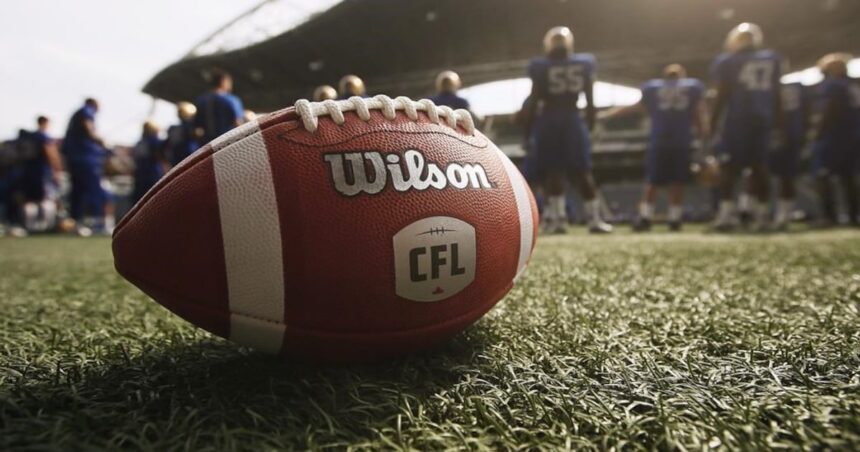I settled into the metal bleachers at the University of Windsor’s Alumni Field, watching players in blue and gold run through drills in the summer heat. When head coach Jean-François Joncas gathered his players at midfield, I noticed something different – they weren’t talking about defensive schemes or offensive playbooks. They were discussing mental health.
“This isn’t just about producing better football players,” Joncas told me later, wiping sweat from his brow. “We’re building better young men who understand their worth beyond the game.”
The University of Windsor Lancers football program launches its innovative camp next month combining traditional football training with mental health education and Name, Image and Likeness (NIL) preparation for student-athletes. It marks one of Canada’s first comprehensive approaches addressing the whole athlete in a landscape increasingly recognizing players’ rights to compensation and well-being.
Joncas, entering his third season with the Lancers, developed the program after noticing concerning patterns among his players during pandemic-era training restrictions. “We saw anxiety levels spike when players lost their routine and community. Football gives structure, but we weren’t equipping them for the pressures that come with being student-athletes.”
The three-day camp will feature daily on-field sessions focused on position-specific training alongside workshops led by sports psychologists and financial advisors. According to Athletics Ontario, mental health concerns among university athletes increased by 31% between 2019 and 2022, highlighting the urgency of such programs.
“We’re preparing them for success on the field, but also for what happens when the crowd noise fades,” said Dr. Marta Silverman, UWindsor’s lead sports psychologist who helped design the mental health curriculum. “Athletes face unique pressures – performing while balancing academics, managing social media scrutiny, and considering their futures. These aren’t casual conversations anymore; they’re survival skills.”
The NIL component represents perhaps the most forward-thinking aspect of the camp. While American college athletes have been permitted to profit from their name, image and likeness since 2021, Canadian universities are just beginning to navigate these waters. U SPORTS, Canada’s governing body for university athletics, published initial guidelines last year, though comprehensive regulations remain in development.
“We’re seeing the landscape change rapidly,” explained Lancers Athletic Director Danielle Sorrentino. “Our athletes deserve to understand their rights and responsibilities before opportunities arise. Many don’t realize they can already pursue certain endorsements without violating eligibility rules.”
James Malik, a third-year defensive back from Mississauga, appreciates the program’s practical approach. “Most of us won’t play professionally, but we’re building skills that transfer to careers. Learning to market yourself, manage stress, and build resilience – that’s what employers want too.”
The camp arrives as Windsor’s football program experiences a revitalization. The Lancers posted a 4-4 record last season – their best finish since 2014 – suggesting Joncas’ holistic approach may be paying dividends on the scoreboard as well.
Local businesses have noticed. Three Windsor companies have already signed on as camp sponsors, with representatives planning to attend the NIL sessions to discuss potential partnership opportunities with athletes.
“This isn’t the NCAA with million-dollar deals,” cautioned Sorrentino. “But our athletes deserve to understand how to protect themselves while building personal brands that can create modest revenue streams and, more importantly, professional opportunities after graduation.”
Regional mental health advocates have embraced the initiative. WindsorEssex Community Health reports that young adult males remain among the least likely demographic to seek mental health support despite experiencing significant stressors.
“Sport provides a natural entry point for these conversations,” noted Trevor Phillips from the Canadian Mental Health Association’s Windsor-Essex branch, which is providing resources for the camp. “When respected coaches normalize discussing anxiety, depression, or stress management, it reduces stigma dramatically. These young men learn it’s strength, not weakness, to address these issues.”
Parents seem to agree. Registration for the camp, open to current university players and high school prospects, reached 75% capacity within two weeks of announcement.
Christine Weber, whose son plays defensive line for the Lancers, told me she appreciates the program’s comprehensive approach. “Football taught my son discipline and teamwork, but nobody prepared him for the mental toll of balancing school, sport, and life. This camp acknowledges these athletes are whole people, not just performers.”
The camp’s curriculum will include sessions on financial literacy, social media management, and mental health first aid. Sports Minister Pascale St-Onge recently highlighted such initiatives as essential to Canada’s athletic development strategy, noting in a parliamentary committee that athlete mental health represents “our most pressing challenge in sports today.”
As practice wrapped up, I watched Joncas gather his players once more. They huddled tight, arms locked around shoulders – not just teammates but young men navigating a complex world where athletics intersects with mental health, identity, and potential financial opportunity.
“Five years ago, this camp would’ve been unimaginable,” Joncas acknowledged. “But we’re catching up to reality. These players deserve comprehensive support – not just for championships, but for life.”
The UWindsor Football Mental Health and NIL Camp runs August 12-14 at Alumni Field. Registration remains open for participants aged 16-22.






